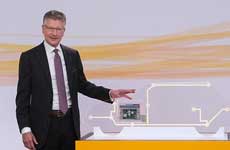
German technology firm Continental is undertaking the realignment of the company initiated in 2019, which it says remains the most important task with annual savings of approximately EUR500 million from 2023 onward, with closures in Mexico and Spain. Meanwhile, the ongoing adjustment of cost structure to the decrease in global vehicle production will result in additional cost reduction of several hundred million euros by 2022, Continental CEO Dr. Elmar Degenhart said at the technology company’s 2020 Annual Shareholders’ Meeting, which was held virtually in Hanover.
“Our restructuring plan is our path into the future. It is and remains our most important task,” underscored Degenhart when addressing the shareholders. “We’re expanding our portfolio where it is growing profitably and making it even more fit for the future. We’re also speeding up our processes by introducing even leaner structures.” Building on this strategy, Continental is planning annual savings of around EUR500 million from 2023.
By minimising overcapacities, decreasing investments, and reducing working capital as well as labour and material costs, Continental plans to save an additional several hundred million euros by 2022.
The technology company is pushing forward with the implementation of its structural programme it announced in September 2019, according to plan. One of these is to close its location in Rubí, Spain, by the end of 2021. As a consequence, the production of display and control technologies at the location is to be gradually phased out or transferred to other European locations by 2021.
Against the back of cost pressure, it is also closing its Nogales location in Mexico. The production of vehicle communication and connectivity technology and drive system components at the location will be gradually phased out probably by mid-2024, with some activities transferred to other locations in the region, said the firm. The Nogales location currently has about 2,000 employees.
Further, Degenhart stated that a key task for Continental is to realign the company to lower global vehicle production, with market observers forecasting production volume for passenger cars and light commercial vehicles in 2020 of 70 million vehicles at most. Continental predicts that the record level seen in 2017 totalling over 95 million units will not be witnessed again before 2025 at the earliest.
In addition, Continental is focusing on three areas of technology: digitalisation; assisted and automated driving, with autonomous driving based on this concept; and emission-free drive systems. “Because we have committed to innovation at an early stage and are pursuing it with vigour and purpose, we are and will remain a pioneer in the industry,” said Degenhart.
Continental technologies are geared toward competitiveness and future viability, and thus support sustainable growth. “Our heart beats for a healthy mobility ecosystem,” explained Degenhart. “This is a system in which all three key requirements are balanced: ecologically, economically and socially.” The solutions developed by Continental pave the way for this by enhancing environmental protection and supporting carbon neutrality, by placing an emphasis on affordability and by facilitating personal mobility for individuals. “This huge task starts with us. As early as this year, we will buy electricity only from verified renewable sources for all our plant locations worldwide,” said Degenhart, outlining the company’s roadmap. “By 2040, our production will be carbon-neutral and by 2050 we will eliminate CO2 emissions in all the stages of our value chain.”
It is harnessing digitalisation and software to drive its profitable and sustainable growth. “Software is the oxygen of industry, since it lays the foundation for completely new services. Value creation with software is recording double-digit percentage growth each year,” explained Degenhart. Backed by high-performance computers – the digital heart of vehicles – Continental already generates sales exceeding EUR3 billion (calculated over the life of the car model series in question).
“One customer alone will have received 2.5 million such computers from Continental by 2022. And this is only the beginning. By 2022, we expect more than ten further projects for this innovation,” said Degenhart.
A second growth area for Continental is the business with systems for assisted and automated driving. “We’re developing these technologies with a view to zero accidents and zero fatalities on roads. The driver assistance system business is experiencing growth like no other,” said Degenhart. In addition, Continental currently sells around 350 million sensors annually in the area of passive safety. With respect to the brakes business, Degenhart projected that just shy of 40 million highly integrated braking systems will be produced by the company by 2023.
The third growth area for Continental is technologies for clean vehicle drive systems. “The ‘e’ in e-mobility does not stand just for ‘electric.’ It also stands for ‘emission-free.’ Whether with batteries or fuel cells, e-mobility is a real growth market. It therefore offers huge potential for Vitesco Technologies,” explained Degenhart. For most products in the drive systems family, Continental is expecting the market to grow by approximately 30% annually in the next five years.
